Surrogacy in Virginia-A Comprehensive Guide

Surrogacy is an increasingly popular option for individuals and couples who are unable to carry a child due to various medical or personal reasons. The surrogacy process facilitates the creation of families through a unique partnership between intended parents and a surrogate.
Get in touch for a Free Surrogacy Consultancy:
📲 +91-8800481100 ( WhatsApp, Line, Viber)
Surrogacy in Virginia is regulated by specific laws, which provide a structured framework for understanding the rights and responsibilities of all parties involved. Whether through traditional surrogacy, where the surrogate uses her own egg, or gestational surrogacy, where an embryo created through in vitro fertilization (IVF) is implanted, potential parents have various pathways to explore their family-building options.
Additional guide for intended parents:
Why Choose Virginia for Surrogacy?
Virginia stands out as a favorable location for surrogacy for several reasons:
- Legal Clarity: Virginia surrogacy laws are notably supportive, allowing for valid and enforceable surrogacy contracts. This legal framework provides peace of mind for intended parents regarding parental rights.
- Access to Reputable Agencies: A plethora of established surrogacy agencies operate in Virginia, offering professionalism and experience in matching intended parents with surrogates. These agencies serve as intermediaries, facilitating the entire process and ensuring compliance with legal requirements.
- Fertility Centers: Virginia is home to advanced fertility centers, equipped with state-of-the-art technology and medical expertise, essential for a successful surrogacy journey.
- Supportive Community: The presence of support groups and resources dedicated to surrogacy can help intended parents and surrogates navigate the emotional and practical aspects of their shared experience.
The Surrogacy Laws in Virginia
Understanding the legal implications of surrogacy in Virginia is essential for both intended parents and surrogates. Virginia surrogacy contracts are recognized by law, which includes provisions that ensure the surrogate relinquishes parental rights post-birth. However, certain requirements must be adhered to, including:
- Medical Necessity: For intended parents who are pursuing gestational surrogacy, medical reasons for not carrying a child themselves should be documented.
- Written Agreements: Surrogacy agreements must be comprehensive, outlining the expectations, responsibilities, and compensation for all parties involved.
With a clear legal guide on surrogacy in Virginia, individuals can embark on their journey with confidence, knowing their rights are protected and clearly defined.
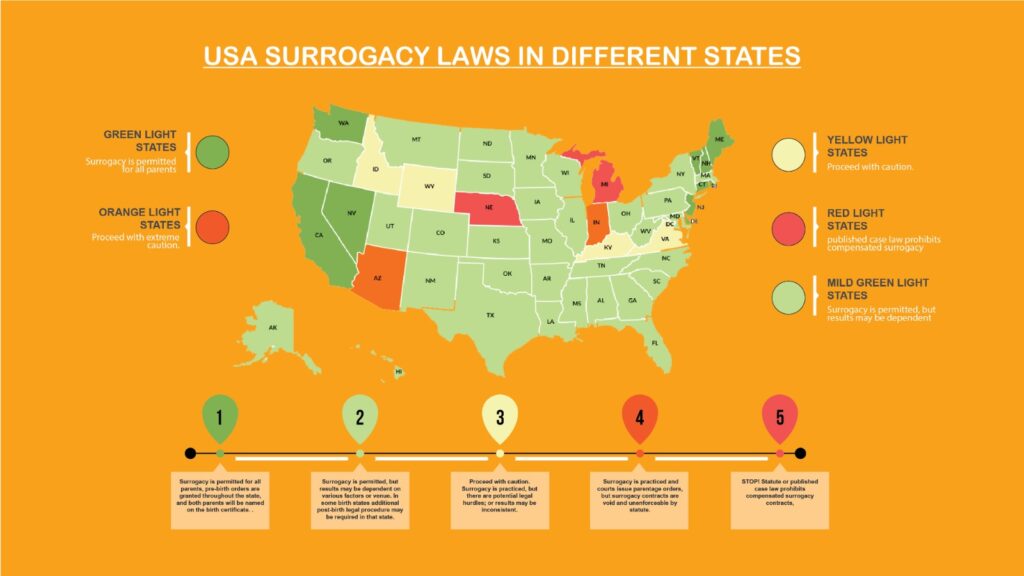
Types of Surrogacy: Traditional vs. Gestational
When considering a surrogacy option, understanding the differences between traditional and gestational surrogacy is paramount:
- Traditional Surrogacy in Virginia: In this model, the surrogate is the biological mother of the child, as her egg is used for conception. This type often involves a more complicated emotional and legal landscape, as parental rights can become contentious, necessitating further legal intervention to establish parentage.
- Gestational Surrogacy in Virginia: This method entails the use of the intended mother’s egg or a donor egg, which is fertilized and implanted into the surrogate. The surrogate has no genetic connection to the child, simplifying legal matters and offering a clearer path for parental rights to be assigned to the intended parents.
For individuals navigating their options in Virginia, understanding these distinctions is critical for setting expectations and preparing for the surrogacy process Virginia offers.
The journey can indeed be complex, but knowing the available choices and legal standing allows for a more informed and empowered experience in growing one’s family.
The Surrogacy Process Explained
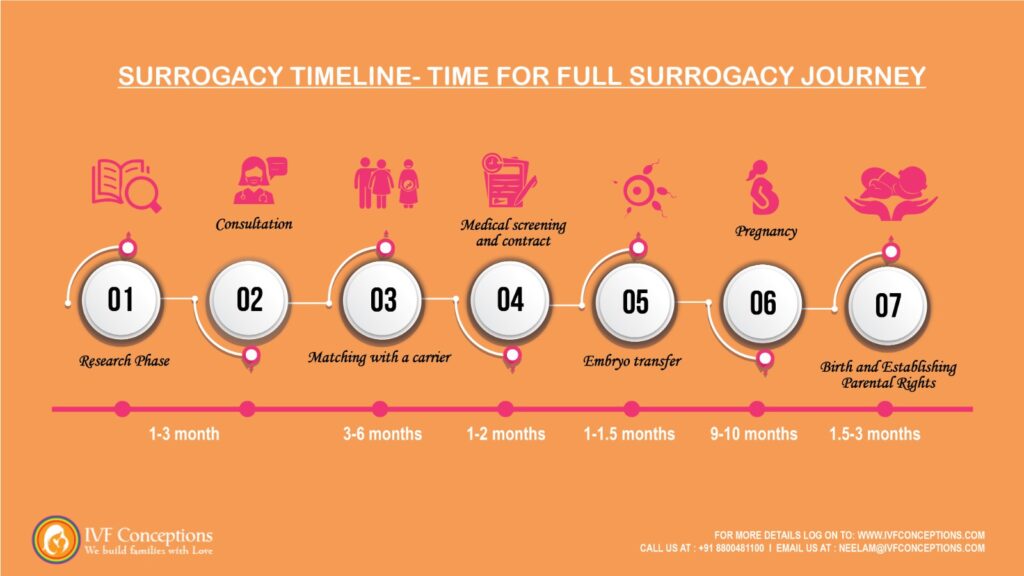
Step-by-Step Guide to the Surrogacy Process
Embarking on the surrogacy journey involves several critical steps that ensure the process is structured and legally compliant. Below is a detailed overview of these steps:
- Initial Consultation
- Engage with a surrogacy agency Virginia to discuss your goals and understand the surrogacy options available.
- Potential parents meet with legal and medical professionals to review Virginia surrogacy laws and determine eligibility.
- Choosing the Type of Surrogacy
- Decide between traditional surrogacy Virginia, where the surrogate uses her egg, or gestational surrogacy Virginia, which involves IVF using the intended mother’s or donor’s egg.
- Surrogate Screening
- The selected agency will conduct a thorough surrogate screening process to ensure that the surrogate is medically fit and emotionally prepared.
- Medical evaluations will address the potential surrogate’s health and ability to carry a child.
- Legal Agreements
- Draft and finalize surrogacy agreements Virginia between intended parents and the surrogate to outline legal rights, responsibilities, and compensation.
- Each party should have separate legal representation to safeguard their interests.
- Medical Procedures
- If pursuing gestational surrogacy, IVF procedures will be scheduled at an accredited fertility center Virginia.
- The surrogate undergoes embryo transfer, followed by regular monitoring of the pregnancy.
- Pregnancy Journey
- Throughout the pregnancy, intended parents maintain regular communication with the surrogate, providing emotional support and maintaining involvement in prenatal appointments.
- Birth and Legal Finalization
- After the birth, legal documentation should be filed to finalize parental rights, allowing intended parents to assume legal custody.
Matching with a Surrogate: What to Expect
Matching with a surrogate is a pivotal aspect of the surrogacy process Virginia. Effective matching enhances the likelihood of a successful and harmonious experience. Key points include:
- Finding the Right Match:
- Discuss preferences and criteria with the surrogacy agency Virginia to find a surrogate who aligns with your values and expectations.
- Building a Relationship:
- Engage in open dialogue to foster a supportive relationship. Building trust is essential and can alleviate potential concerns throughout the process.
- Shared Goals:
- Establish clear mutual goals regarding parenting, pregnancy involvement, and the implications of the surrogate’s role.
Medical and Legal Procedures in Surrogacy
Understanding the medical and legal procedures that are part of the surrogacy journey is crucial for intending parents:
- Medical Procedures:
- Comprehensive fertility evaluations determine the best approach for IVF.
- Surrogate preparation involves hormone treatments to prepare her body for the embryo transfer.
- Regular ultrasounds and check-ups ensure the health of the pregnancy.
- Legal Procedures:
- In Virginia, surrogacy contracts outline the expectations and legal rights of all parties, which are crucial to prevent disputes.
- Known as a legal guide to surrogacy Virginia, these contracts protect the interests of intended parents, ensuring the surrogate relinquishes all rights to the child post-birth.
The Role of Agencies vs. Independent Surrogacy
When embarking on a surrogacy journey, intended parents have the option of working through a surrogacy agency Virginia or pursuing independent surrogacy:
- Working with a Surrogacy Agency:
- Agencies provide a structured process that includes surrogate screening, legal support, and ongoing counseling.
- They can facilitate the matching process and help navigate potential challenges during the pregnancy.
- Independent Surrogacy:
- Intended parents may choose to find a surrogate independently through personal networks. This approach demands thorough knowledge of Virginia surrogacy laws to manage legal documentation and agreements properly.
- Both parties must invest time in building a trustworthy relationship, as the lack of professional guidance can increase emotional unpredictability.
Understanding these facets of the surrogacy journey Virginia equips intended parents with essential insights and facilitates informed decisions regarding their family-building endeavors.
Knowledge of legal requirements, medical processes, and supportive relationships fosters a nurturing environment for both the surrogate and the intended parents.

Legal Considerations for Surrogacy in Virginia
What the Law Says: Surrogacy Regulations in Virginia
Navigating the legal framework surrounding surrogacy in Virginia is critical for both intended parents and surrogates. The state is known for its clear and structured Virginia surrogacy laws, which provide a solid foundation for surrogacy agreements. These laws distinguish between traditional surrogacy Virginia, where the surrogate is biologically related to the child, and gestational surrogacy Virginia, where she carries an embryo not genetically related to her.
- Enforceability of Contracts: Legally binding contracts for gestational surrogacy are permissible in Virginia, ensuring that all parties understand their rights and obligations.
- Medical Necessity: Virginia surrogacy generally requires that intended parents demonstrate a legitimate medical need that makes carrying a child unfeasible for them.
Contracts: Importance and Key Elements
Virginia surrogacy contracts serve as the cornerstone of the legal relationship between intended parents and surrogates, outlining expectations and responsibilities. Key elements include:
- Compensation Details: In cases of compensated surrogacy Virginia, the agreements must specify the financial arrangements for the surrogate, such as base compensation and additional allowances for medical costs.
- Parental Rights: The contracts must clarify the meant-to-be parental rights of the intended parents post-birth, ensuring a smooth transition of custody.
- Medical Decisions: Agreements should include authorizations for medical decisions related to the pregnancy, specifying how such decisions will be made.
Parental Rights and Birth Parent Agreements
Understanding how parental rights are established is essential for intended parents pursuing surrogacy in Virginia. After birth, intended parents must file for a court order to establish their parental rights:
- Birth Parent Agreement: This legal document solidifies the roles of both the surrogate and intended parents, ensuring that parental rights are relinquished by the surrogate.
- Pre-Birth Orders: Virginia allows for some legal maneuvers to establish parental rights pre-birth, but the process may vary based on evolving laws and individual cases.
Navigating Legal Challenges in Surrogacy
While many intended parents and surrogates experience smooth journeys, legal challenges can arise during the surrogacy process Virginia. Potential issues include:
- Disputes Over Contracts: If disagreements occur regarding financial compensation or expectations, these can lead to legal battles. Having a comprehensive contract in place is crucial for mitigating such risks.
- Emotional Considerations: The emotional dynamics between parties can complicate legal matters, particularly if the pregnancy does not proceed as planned. Ensuring that all parties have access to counseling and mediation can help navigate these emotional challenges.
By understanding the nuances of the legal guide surrogacy Virginia, intended parents and surrogates can better prepare for the complexities of surrogacy. Engaging legal professionals who specialize in surrogacy can provide clarity and protection throughout the entire journey, enhancing the overall experience of building a family.
How much does surrogacy cost in Virginia?

Understanding the Costs Involved in Surrogacy
Embarking on the surrogacy journey Virginia entails a range of financial commitments that intended parents must carefully consider.
Gestational surrogacy cost in Virginia can vary significantly based on factors such as agency fees, medical expenses, and surrogate compensation. The primary cost components include:
- Agency Fees: Surrogacy agencies typically charge between $15,000 to $30,000 for their services. These fees cover matching, counseling, and administrative support throughout the surrogacy process.
- Surrogate Compensation: Depending on experience and location, surrogates may expect compensation ranging from $40,000 to $70,000 or more for gestational surrogacy. This amount may vary for traditional surrogacy Virginia, where compensation may differ due to the surrogate’s genetic relationship to the child.
- Medical Expenses: Intended parents should anticipate costs associated with IVF procedures at a fertility center Virginia, which can range from $15,000 to $30,000 per cycle, including hormone treatment, egg retrieval, and embryo implantation.
- Legal Fees: Engaging an attorney to draft and review Virginia surrogacy contracts is essential, with legal fees typically amounting to $5,000 to $10,000.
Insurance Coverage and Medical Expenses
Insurance plays a critical role in the financial landscape of surrogacy. Intended parents need to navigate the complexities of insurance coverage, which can significantly impact the overall cost:
- Surrogate’s Insurance: It is vital to verify that the surrogate has coverage that includes pregnancy and maternity benefits. Some agencies facilitate obtaining supplementary insurance if the surrogate’s coverage is insufficient.
- Out-of-Pocket Expenses: Intended parents must remain prepared for potential out-of-pocket medical expenses not covered by insurance, including pre-existing condition evaluations, pregnancy-related costs, and postpartum care.
Financial Support Options for Intended Parents
As intended parents explore surrogacy options Virginia, knowing available financial support avenues can alleviate some of the burdens:
- Loans for Surrogacy: Major financial institutions and dedicated lending companies offer loans specifically for fertility treatments and surrogacy-related costs, allowing parents to spread their expenses over a manageable timeframe.
- Grants and Scholarships: Various non-profit organizations offer financial assistance or grants to families pursuing surrogacy, aimed at reducing the emotional and financial stress involved in the process.
- Crowdfunding: Many intended parents turn to crowdfunding platforms to garner support from friends, family, and even the public to assist in covering surrogacy costs.

Budgeting for a Surrogacy Journey
Creating a comprehensive budget is an essential step to ensure financial readiness throughout the surrogacy process. Intended parents should:
- Itemize Costs: Begin by listing all potential expenses associated with the surrogacy journey, including agency fees, medical costs, legal fees, and surrogate compensation.
- Establish a Financial Reserve: Allocate funds for unexpected expenses that may arise during the process, such as additional medical procedures or legal consultations.
- Monitor Progress: Regularly review and adjust your budget as necessary to align with your evolving financial situation and any new findings regarding Virginia surrogacy information.
Affordable International Surrogacy Countries: Alternatives to High-Cost USA Surrogacy Programs
For many intended parents, the high cost of surrogacy in the USA—ranging between $120,000 and $200,000—makes international surrogacy an attractive alternative. Several countries offer affordable surrogacy options while maintaining ethical and legal safeguards.
Why Choose International Surrogacy?
- Cost Savings: Significant reduction in costs compared to the USA.
- Access to Surrogacy-Friendly Laws: Some countries have clear, legally binding frameworks.
- Cultural Accessibility: Countries like Mexico and Colombia are geographically close and culturally accessible for many intended parents.
- Broader Eligibility: Countries like Argentina allow surrogacy for LGBTQ+ couples and single parents.
Factors to Consider While Choosing an International Surrogacy Destination
- Legal Framework: Understand the surrogacy laws in the chosen country and ensure contracts are enforceable.
- Cost: Compare costs, including medical treatments, legal fees, and travel expenses.
- Eligibility: Ensure you meet the eligibility criteria, including marital status and medical indications.
- Medical Infrastructure: Choose a country with reliable clinics and experienced medical professionals.
- Proximity and Travel Requirements: Consider travel costs, visa requirements, and the ease of returning home with the baby.
- Cultural and Language Barriers: Opt for countries where language and cultural differences are manageable.
- Support Systems: Work with experienced surrogacy agencies and legal teams familiar with the local processes.
By thoroughly researching and considering these factors, intended parents can choose the best international surrogacy destination that aligns with their financial, legal, and emotional needs.
Top Affordable Surrogacy Destinations- Cheapest Countries for Surrogacy
Below is a look at some of the most cost-effective international surrogacy destinations, including their processes, costs, legal frameworks, and eligibility criteria.
1. Surrogacy in Mexico
- Process: Surrogacy is largely unregulated except in certain states like Tabasco. Surrogacy arrangements are conducted through private agreements with clinics.
- Cost: $60,000–$80,000
- Legal Framework: Only available for heterosexual married couples or single parents in certain states.
- Eligibility: Requires legal contracts; intended parents must work with experienced lawyers to ensure enforceability.
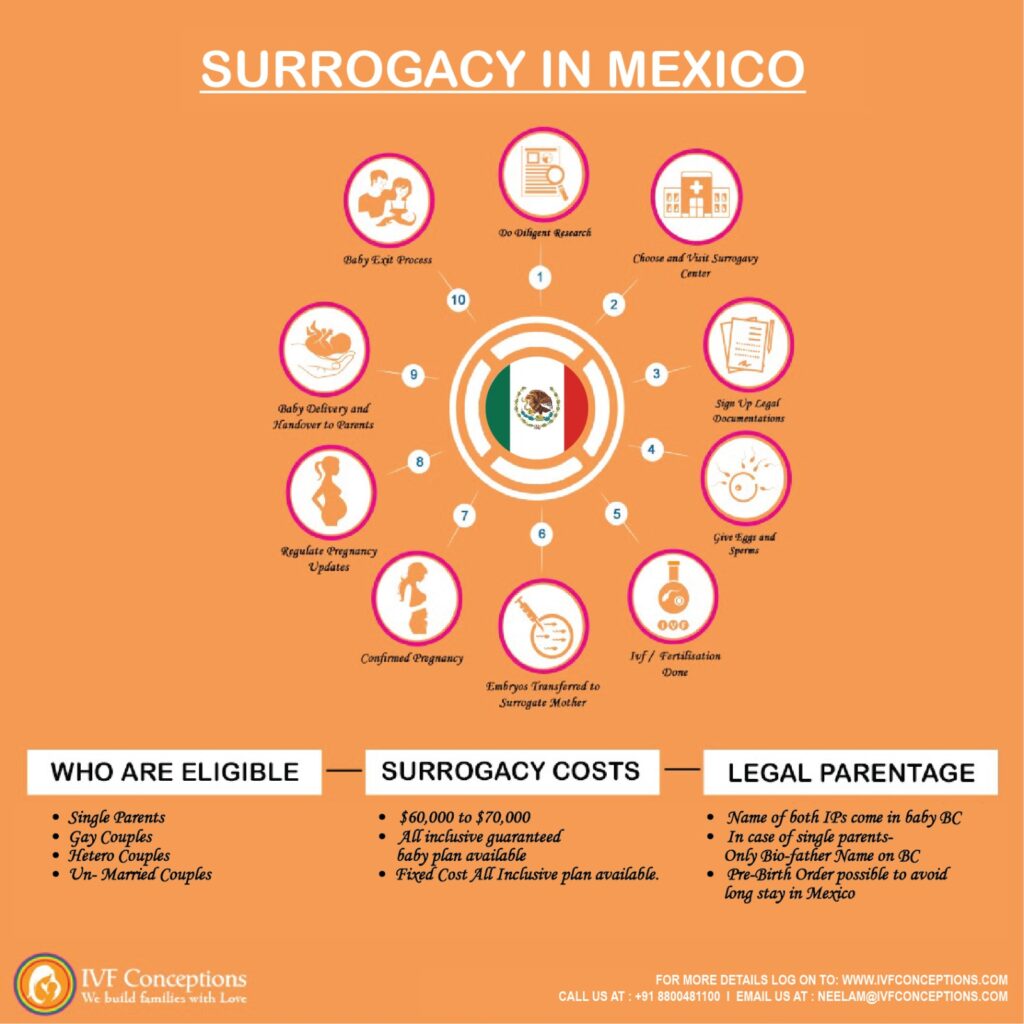
2. Surrogacy in Colombia
- Process: Altruistic surrogacy is allowed, with a focus on legally binding contracts. IVF treatments are accessible at reasonable rates.
- Cost: $60,000–$70,000
- Legal Framework: Open to heterosexual couples and single parents.
- Eligibility: No citizenship requirements; contracts must be reviewed to ensure compliance with Colombian law.
3. Surrogacy in Georgia (country)
- Process: Georgia has well-established surrogacy laws, and agreements are legally binding.
- Cost: $50,000–$70,000
- Legal Framework: Available only to heterosexual married couples. Parental rights are granted exclusively to the intended parents.
- Eligibility: Requires marriage certificates with at least one year of partnership.
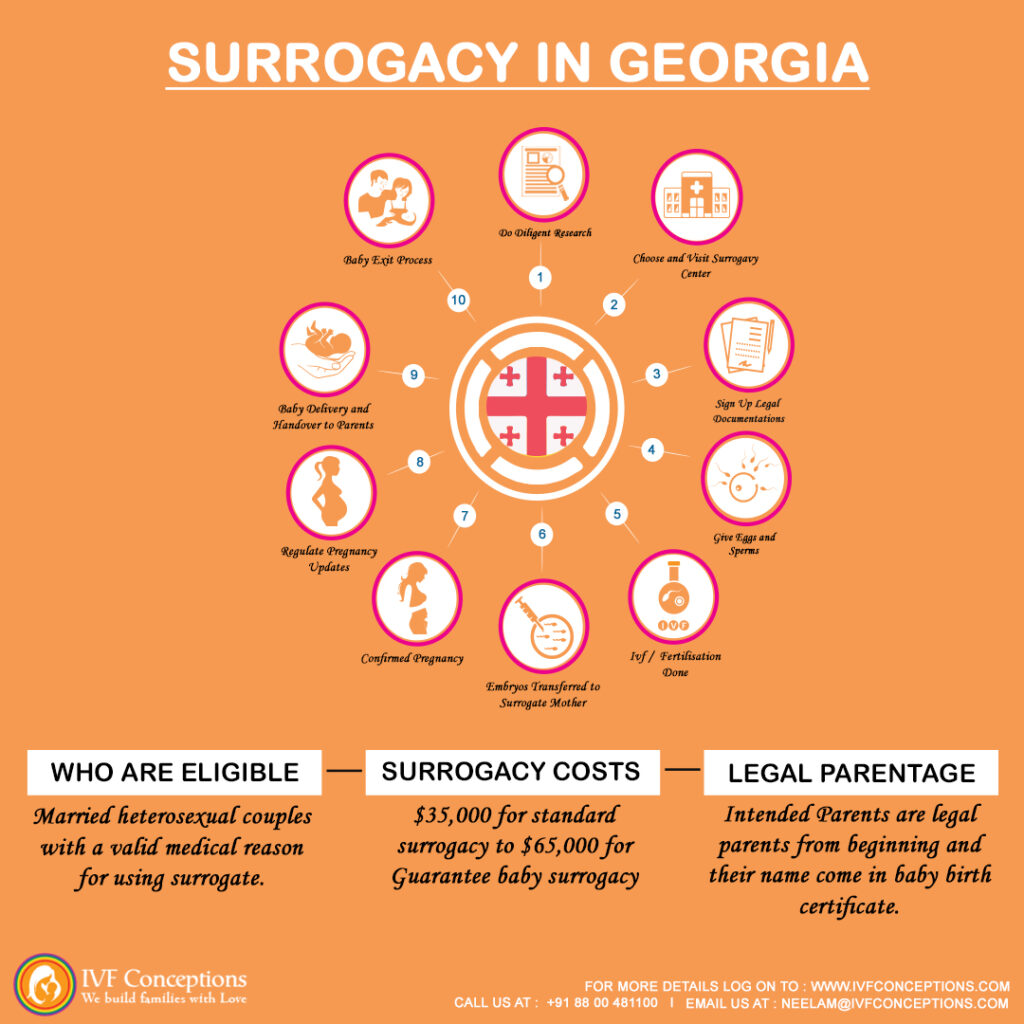
4. Surrogacy in Ukraine
- Process: One of the most popular destinations before the geopolitical crisis, offering transparent processes and strong legal protections.
- Cost: $50,000–$70,000
- Legal Framework: Only heterosexual married couples are allowed. Surrogates have no parental rights.
- Eligibility: Only married hetero couples with proof of medical need are required.
5. Surrogacy in Armenia
- Process: Armenia’s surrogacy laws provide legal certainty, making it a growing destination for intended parents.
- Cost: $50,000–$70,000
- Legal Framework: Open to heterosexual married couples.
- Eligibility: Requires couple to be married hetero and age limit for female partner is 53.
6. Surrogacy in Argentina
- Process: Altruistic surrogacy is practiced, but contracts are not legally enforceable. Families work closely with surrogates and clinics.
- Cost: $50,000–$70,000
- Legal Framework: No specific laws on surrogacy, but recognized through family law. Open to all family types, including LGBTQ+ couples.
- Eligibility: Collaboration with legal experts is crucial to navigating the informal framework.
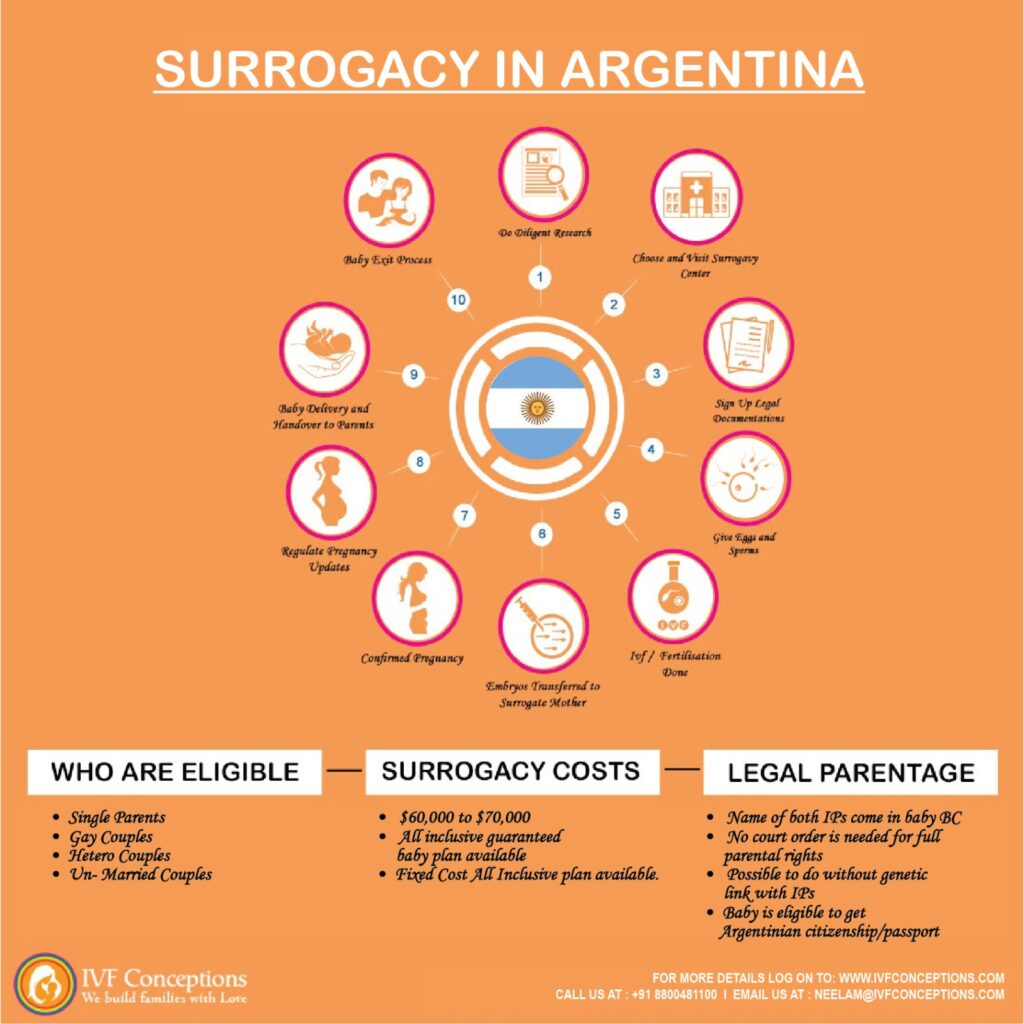
7. Surrogacy in India
- Process: India recently reopened surrogacy to Indian citizens only, with a focus on altruistic arrangements.
- Cost: $25,000–$40,000
- Legal Framework: Available only to heterosexual married Indian couples/ Surrogacy in India for NRI and Surrogacy in India for OCI is possible if thy fulfill all other conditios; commercial surrogacy is banned.
- Eligibility: Couples with citizenship of India/ NRI/ OCI card holder and medical need documentation are mandatory.
Comparative Table: Surrogacy Costs in the USA and Surrogacy Abroad Countries
| Country | Cost Range | Legal Framework | Eligibility Criteria | Key Feature |
| USA | $120,000–$200,000 | Fully regulated, binding | Open to all family types | High-quality medical and legal services |
| Mexico | $60,000–$80,000 | Semi-regulated, binding in parts | Heterosexual married couples, singles | Lower costs and proximity for Americans |
| Colombia | $50,000–$70,000 | Binding legal contracts | Open to heterosexual couples, singles | Affordable and accessible IVF treatments |
| Georgia | $40,000–$60,000 | Strict legal framework | Heterosexual married couples | Strong legal protection |
| Ukraine | $40,000–$70,000 | Strict legal framework | Heterosexual married couples | Transparent and reliable processes |
| Armenia | $50,000–$70,000 | Strong legal protections | Heterosexual married couples | Growing popularity with legal certainty |
| Argentina | $40,000–$60,000 | Informal, family law-based | Open to all family types | LGBTQ+ friendly with affordable options |
| India | $25,000–$40,000 | Strict, altruistic only | Indian citizens only | Most affordable option for eligible parents |
Looking for “best” Surrogacy clinic / Surrogacy agency abroad?
We are here to help with more than 15 years of experience in offering safe, reliable and affordable surrogacy options globally.
We analyze your needs, budget planning, egg donor availability, destination preferences with legal framework and find top surrogacy country and agencies for you!
Our consulting services are free of cost and do not affect your costing in any way but help you to save tons of research time and money.
Additional guide for intended parents:
Conclusion
In conclusion, many intended parents and surrogates do not view surrogacy in Virginia as a feasible option because they do not meet the stringent requirements or because they desire more freedom and choice in their surrogacy journey.
Many Virginians choose to use surrogates from other states whose surrogacy laws are more understanding and uncomplicated. However, other legal steps and costs might also be required in order to prove parental rights and send the child back to Virginia.
Our Complete Surrogacy Consulting Services /Case Management cover a wide range of services globally, including:
✓ Guide and Support to choose the secure and legal surrogacy program
✓ Surrogacy clinic and agency recommendations
✓ Legal support and referrals
✓ Logistic support/planning
✓ Surrogacy agency liaison
✓ Financial planning/financial aids
✓ Citizenship and passport assistance
✓ Case management
✓ Shipment assistance
✓ Collaborations with third-party support (if you have your own clinic/agency to make sure your program is done properly)
✓ Quick and transparent communication
At COMPLETE SURROGACY our goal is to ensure a affordable, reliable, smooth and supportive experience as you start this remarkable journey towards parenthood. If there are any specific questions, concerns, or details you’d like to discuss, please don’t hesitate to let me know.
We are happy to assist you with one of our global surrogacy programs best suited you your personal and legal needs. I am here to assist you every step of the way
Get in touch for a Free Surrogacy Consultancy:
📲 +91-8800481100 ( WhatsApp, Line, Viber)

Frequently Asked Questions about Surrogacy in Virginia
What are the requirements to become a surrogate in Virginia?
Becoming a surrogate in Virginia involves specific eligibility criteria to ensure the health and readiness of the surrogate. Common requirements include:
- Age: Surrogates typically must be between the ages of 21 and 40.
- Health: A comprehensive medical assessment is necessary to confirm the surrogate’s physical health and ability to carry a pregnancy. This often includes evaluations through a fertility center Virginia.
- Previous Pregnancies: Most agencies and intended parents prefer surrogates who have successfully completed at least one pregnancy and have a child living with them.
- No Criminal Record: Background checks are part of the surrogate screening Virginia process, ensuring the surrogate’s history aligns with the expectations of intended parents.
- Residency: Some agencies may require that surrogates are residents of Virginia or a neighboring state.
How long does the surrogacy process typically take?
The duration of the surrogacy process Virginia can vary based on several factors. Generally, the process takes about 12 to 18 months from initial agency engagement to the birth of the child. Key timeframes include:
- Matching with a Surrogate: This can take anywhere from a few weeks to several months, depending on the compatibility between intended parents and surrogates.
- Medical Procedures: The IVF and medical preparation process may take several months, involving hormone treatments and embryo transfers.
- Pregnancy Duration: The surrogate carries the pregnancy to term, typically about nine months.
Can single individuals pursue surrogacy in Virginia?
Yes, single individuals can pursue surrogacy in Virginia. Recent changes in Virginia surrogacy laws have become more inclusive, allowing single individuals to access surrogacy services. Important considerations include:
- Choosing the Right Agency: It is essential to select a surrogacy agency Virginia that is open to assisting single parents.
- Legal Agreements: Single intended parents should ensure that their Virginia surrogacy contracts are explicitly drafted to reflect their unique family dynamics and rights.
What should intended parents know about selecting a surrogate?
Selecting a surrogate is a pivotal decision in the surrogacy journey. Intended parents should consider the following aspects:
- Compatibility: Assess whether the surrogate’s values, lifestyle, and expectations align with the intended parents’ vision for the pregnancy.
- Health and Medical History: Evaluate the surrogate’s medical needs and history, ensuring she is a good candidate for successful pregnancy.
- Support System: Understanding the surrogate’s familial and social support can impact her overall well-being during the pregnancy.
Are there any tax implications for surrogates and intended parents?
Both surrogates and intended parents should be aware of potential tax implications surrounding the surrogacy process. Relevant considerations include:
- Compensated Surrogacy Virginia: Compensation received by surrogates may be considered taxable income. It is advisable for surrogates to consult a tax professional to understand their liabilities.
- Medical Expenses: Intended parents may be eligible for certain tax deductions related to medical expenses incurred during the surrogacy journey. Consulting with a financial advisor can help clarify eligible deductions.
Disclaimer:
All legal information on this website is intended only as a guide and is not a replacement for the opinions of licensed legal professionals/Medical professionals. Some information may have changed since the time of publication. We advise you to consult a licensed attorney/Medical expert with authority in fertility/surrogacy processes.

Author Bio: Neelam Chhagani is an International Surrogacy Expert with 15 years of experience in the fertility and surrogacy domain. As the founder of IVF Conceptions and Complete Surrogacy, she has guided over 4,000 intended parents worldwide on their surrogacy journey to parenthood. Recognized as a trusted authority, she specializes in holistic infertility solutions and third-party reproduction consulting.
Holding an MA in Counselling Psychology and a PGD in Mental Health, Neelam is a proud member of the European Fertility Society (EFS) and the European Society of Human Reproduction and Embryology (ESHRE). She is also a leading surrogacy blogger, providing valuable insights into ethical and practical surrogacy solutions.
Since 2010, committed to supporting ALL family types, Neelam has been passionate about helping intended parents grow their families with compassion, integrity, and a focus on secure and affordable surrogacy options Globally.
Learn more about Neelam:
https://www.ivfconceptions.com/neelam-chhagani-surrogacy-consultant/
https://www.linkedin.com/in/neelam-chhagani-92892229/















I was introduced to Neelam by a friend who worked with Neelam for surrogacy. Neelam is absolutely wonderful. I am a single male and the journey to fatherhood is not that easy. Neelam connected me to a program ideal for my circumstances. She was with me throughout the pregnancy providing advice and guidance along the way. I am so grateful I found her and am thrilled today that I have a beautiful daughter. I highly recommend Neelam to anyone who is on a journey to become a parent. Having a child has changed my world for the better. I wish others success with their own journey and recommend you connect with Neelam to find a path that is best for you.
SA (USA)